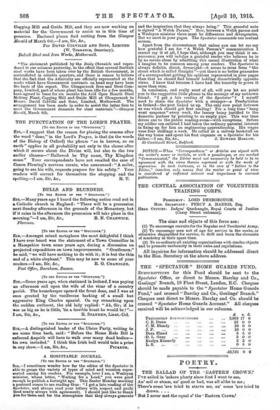A HOSPITABLE JOURNAL.
[To ran Emum or Ins Braor•ron."1
sometimes wcmder how far the editor of the Spectator is able to gauge the variety of types of mind and vocation repre- sented among his readers. For example, here I am, a Wesleyan minister, whose letter, "Waiting for a Lead," you were good enough to publish a fortnight ago. This Easter Monday morning a poateard comes to me reading thus : " I get a late reading of the Spectator, and always read your letters with respect and profit (and nearly always with agreement). I should just like to thank 3045 for them and for the atmosphere that they always generate and the inspiration that they always bring." This graceful note is signed "A Welsh Parson." Now, between a Welsh parson and a Wesleyan minister there must be differences and divergencies. But we most in your pages. The Spectator commands our mutual esteem.
Apart from the circumstance that unless you can let me say how grateful I am for "A Welsh Parson's" communication I cannot say it at all, I hope that, although you may think it un- necessary, you will indulge a grateful reader who believes he is by no menus alone by admitting this casual illustration of what I imagine to be common among your readers. The Spectator is always definite, direct, downright—it seems to issue from "the street which is called Straight "—yet therein no better guarantee of a correspondent getting his opinions represented in your pages than that he should find himself holding diametrically opposite views. I know that because I have had the temerity to prove it more than once.
In conclusion, and really most of all, will you let me point you to the suggestive little phrase in the message of any unknown friend "I get a laic reading of the Spectator"? I myself used to share the Spectator with a stranger—a Presbyterian in Ireland—the post linked us up. The only sore point between us was which should get first reading! For a long time "bang went saxpence" every week, the luxury being justified to the domestic partner by pointing to an empty pipe. This war time drives one to the public reading-room—with exceptions. Before my soldier son enlisted I had taken the ordinary parental interest in fixing up for him an engineering apprenticeship. His wages were fear !shillings a week. He called at a railway bookstall on the way home and spent his first sixpence on a Spectator for his
30 Could well Street, Bedford.






































 Previous page
Previous page